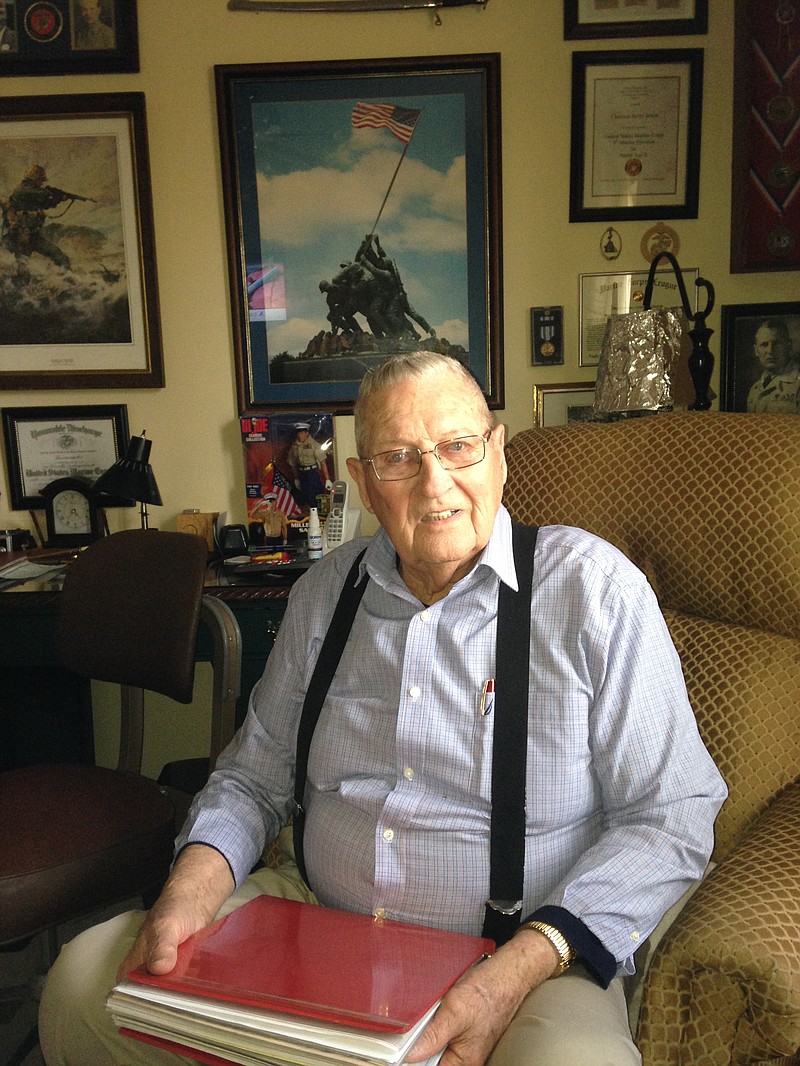Clarence Schutt, 89, pushed down his sock to show me his left ankle.
"See that?" he said, pointing to a patch of skin two shades darker than the rest of his leg. "That's from Korea."
Schutt, a retired long-haul trucker and former U.S. Marine sergeant, explained that his feet became hardened by frostbite in the brutal winter of 1950 when American forces on the Korean peninsula faced temperatures of minus-40 degrees.
When a military doctor tested his foot with a metal probe, Schutt remembers, it sounded like someone tapping a rock with a screwdriver.
Schutt telephoned the Times Free Press news desk last week to remind us of the 70th anniversary of the raising of the American flag on Mt. Suribachi at Iwo Jima, the scene of one of the bloodiest battles of World War II.
About 7,000 U.S. Marines were killed at Iwo Jima, and the island eventually became an emergency landing site for American bombers.
Schutt was there on Iwo Jima the day the Stars and Stripes went up, and he feels a special obligation to keep his eyewitness memories alive.
If you saw the famous black-and-white flag-raising photo on page A1 of the Times Free Press on Monday, it's fair to say Schutt [pronounced Shoot] was responsible.
Sitting in an office at his Hixson home, surrounded by war photos and framed medals, the veteran of World War II and Korea talked about those long-ago conflicts. Of the 16 million Americans who served in World War II, only about 1 million are still alive. It is estimated that in less than two decades the last living WWII veterans will have passed away.
But Schutt, who is 6-feet-2 and has a flat-top haircut, still cuts the profile of a Marine.
Schutt was 17 when his father signed him up for early entry into the war, and he still has lucid memories of the February day in 1945 when he stormed the beach at Iwo Jima.
"We rode the ship in and we woke up one morning and all heck was breaking loose," recalls Schutt, who was a buck sergeant in the 5th Pioneer Battalion of the 5th Marine Division.
Soon, the battle became so intense that supply personnel such as Schutt were pushed to the front lines. He remembers climbing down the cargo netting of his ship and dropping into freezing ocean waters before storming the beach.
Later, as the fighting intensified, he carried a Browning automatic rifle, essentially a 21-pound machine gun. Of the 35 men in his platoon, 14 were killed in action at Iwo Jima.
Schutt has a sword from a Japanese soldier killed in the battle hanging on his bedroom wall.
"You do what you were trained to do," he says. "We didn't have anything against any one of those Japanese soldiers. I said a prayer every day: 'I just want to go home.'"
Home was still months away, as Schutt eventually became part of the occupying force in Japan. He served for a time in Nagasaki after an American atomic weapon obliterated the city.
After World War II ended, Schutt joined the Marine reserves, and was one of the first in line when the Korean conflict began a half-decade later.
Again, Schutt was thrust into one of the defining battles of a war, the Battle of Chosin Reservoir, a 17-day fight involving the rescue of American troops surrounded by the Chinese in northern Korea.
The battle is remembered, not only for being bloody, but also for the sub-zero temperatures in which it was fought. Schutt, who was in a unit involved in the successful rescue, remembers going for days without food, consuming only snow for sustenance.
"Some history books only have one paragraph about Korea," Schutt laments. "We lost a lot of good men there."
America is losing a lot of good people every day as members of the Greatest Generation fill the obituary pages of the newspaper.
Meanwhile, the Sergeant Schutts of the world remind us how the sacrifices of the 20th century laid the foundation for freedoms that we still enjoy every day.
Contact Mark Kennedy at mkennedy@timesfreepress.com or 423-757-6645. Follow him on Twitter @TFPCOLUMNIST. Subtupdates at www.facebook.com/mkennedy columnist.

